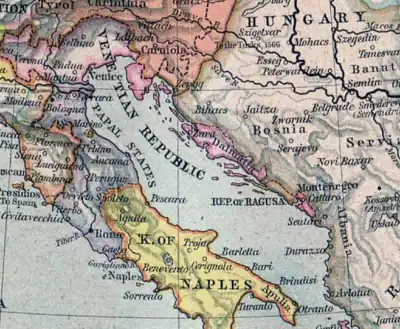_-_Google_Art_Project.jpg.webp)
.jpg.webp)

Schiavone (pronounced [skjaˈvoːne]; feminine Schiavona, plural Schiavoni) is an Italian ethnonym literally meaning "Slavs" in Old Venetian: originally, this term indicated origins in the lands of Dalmatia and Istria (in present-day Slovenia and Croatia), when under the rule of the Republic of Venice. Today it is an Italian surname.
History
The importance of Schiavoni's role in the Venetian Republic is best shown by the name of one of the main streets in Venice, Riva degli Schiavoni, just in front of the Doge Palace and San Marco Square.
A number of artists who worked in Italy who were of Slavic descent were nicknamed Schiavone by their origin: most famous among them are Giulio Clovio, Francesco Laurana, and Luciano Laurana.
Schiavone was also a designation of the Oltremarini, a military unit of the same descent in the Venetian Navy. The basket-hilted sword schiavona was also named after the Schiavone.
Surname
In Italy, the surname Schiavone mostly occurs in the southernmost regions of the mainland, namely Campania and Apulia, but it is also common in Rome, Turin, Milan, and Syracuse.[1][2] Thanks to emigration, branches of the Schiavone family can also be found in Argentina, Brazil, Malta, Uruguay, Luxembourg, United Kingdom, the Philippines the United States, and Canada
Toponymy
- Ginestra degli Schiavoni, a village in Campania, Italy
- Riva degli Schiavoni, a promenade in Venice, Italy
- San Giacomo degli Schiavoni, a village in Molise, Italy
- Scuola di San Giorgio degli Schiavoni, a historical building in Venice, Italy
- Villa Schiavoni near Nepezzano, Teramo, Abruzzo, Italy
People
- Alessandra De Rossi (born 1984), Philippine actress, real name Alessandra Schiavone
- Andrea Schiavone (c. 1510/15–1563), Venetian artist
- Andrea Schiavone (footballer) (born 1993), Italian footballer
- Assunta De Rossi (born 1983), Philippine actress, real name Assunta Schiavone
- Francesca Schiavone (born 1980), Italian tennis player
- Francesco Schiavone (born 1953), member of the Camorra crime syndicate
- Giorgio Schiavone (Juraj Ćulinović, 1433–1504) Dalmatian painter, active in Padua, Italy
- Humberto Schiavoni (born 1958), Argentine politician
- Joe Schiavoni (born 1979), American politician
- Laura Schiavone (born 1986), Italian rower
- Patricio Schiavone (born 1985), Argentine actor
- Patrick Schiavone, American Ford F-150 designer
- Tony Schiavone (born 1957), American professional wrestling announcer
- The Laurie Sisters,[3] née Schiavone, American pop singers and sisters:
- Phyllis "Cathy" Schiavone (1927–2020)
- Caroline "Carole" Schiavone (1928–1994)
- Greta "Rita" Schiavone (1930–2020)
See also
References
- ↑ Cognomi. GENS. Accessed November 15, 2006.
- ↑ Schiavone Archived 2007-05-02 at the Wayback Machine. Origine dei cognomi. Accessed November 27, 2006.
- ↑ https://www.discogs.com/artist/2552947-The-Laurie-Sisters